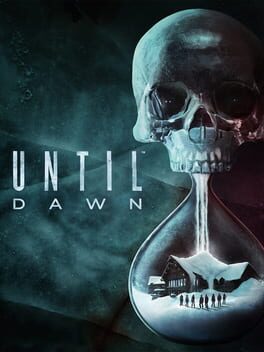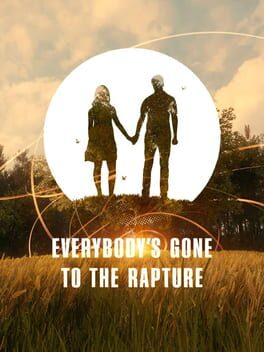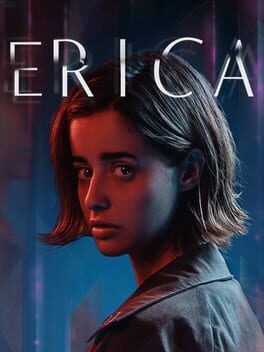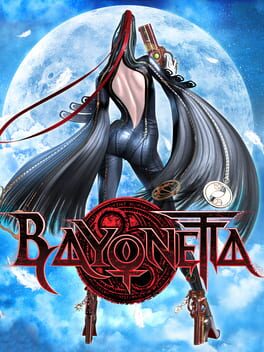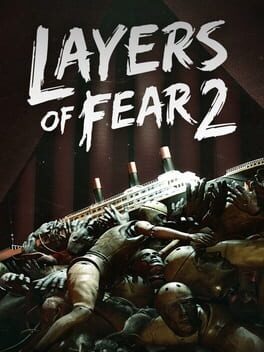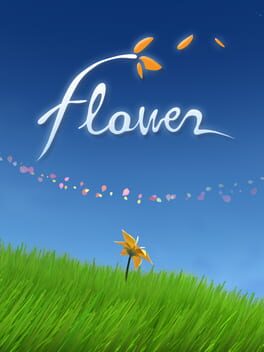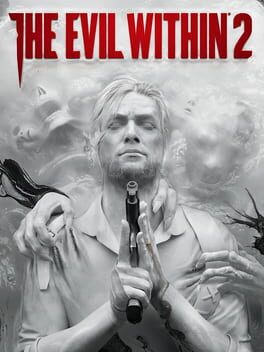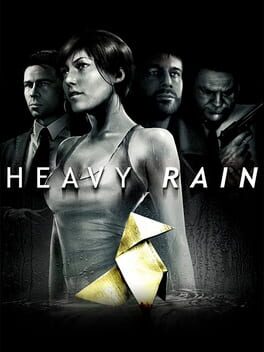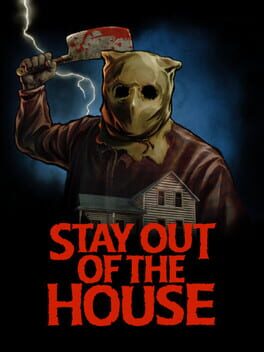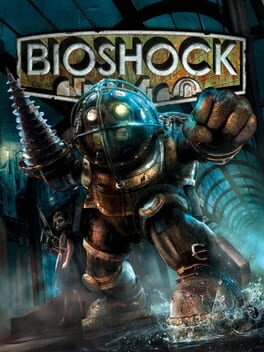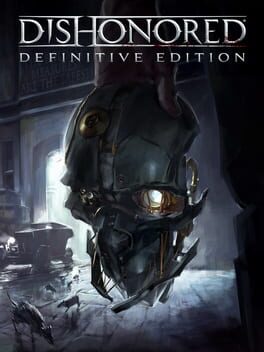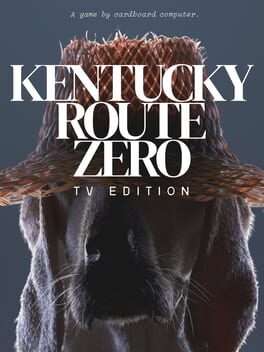pulpfuertes
2016
The little (big) engine that could. It's been said but it bears repeating; this game eats the Call of Duty formula, chews its up, and spits out what that entire franchise could only dream of being. What Respawn does here is insane because it is aware of the surface level comparisons that would inevitably be made and actively subverts every one of the typical tropes found in those games- the corny camaraderie and cringe-worthy banter, the swelling booms and sweeping heroism of the soundtrack, the banal linearity of the level design and bacon crisp gunplay. It's all here sure, but Respawn injects gorgeous attention to detail into the visual atmosphere, boundless creativity in each and every level of its five-six hour campaign, propulsive pacing that pushes this roller-coaster narrative, brutally diverse mech combat, and most importantly, a warm earnestness that permeates every facet of its creation. The game balances a serene and almost ethereal natural landscape with a heavily industrial aesthetic that wouldn't be far off from a James Cameron film. And such as the likes of Aliens and Judgement Day, Titanfall II is as much a story about surfacing imperialist forces weaponizing extraterrestrial technology for further bloodshed as it is a tale of ardent brotherhood; no matter how artificial the links between them are. The first half introduces a couple outlandish gameplay mechanics and gimmicks that keeps things consistently fresh as the relationship between BT and Cooper builds but it's the barreling second half where the weight of cosmic stakes take both literal and metaphorical flight. Cumulatively, it never skips a beat and is just constantly satisfying. It remains silly enough to have fun and not take it too seriously but I won't lie when I say some parts gave me flutters in my heart from the utter immensity of the spectacle (shit looks amazing for 2016 and runs like a dream) and the handling of the dynamic between the two protagonists. For something that was so prone to failure at launch, I was pleasantly surprised by how much returning to this bolstered my previous playthrough and will probably continue to stand the test of time from here on out. Simply put, the apex of blockbuster gaming.
2015
Aggressively 2015 if that makes any sense. There's few sequences in modern horror more iconic than witnessing Hayden Panettiere, bearing only a towel and a dash of courage, fight off a masked clown lunatic in a labyrinth-esque lodge, consistently escaping his clutches by a hair only to face yet another obstacle in the way. The choice-based gimmick lends itself to fascinating philosophical readings but what interests me the most is how the game's overall framework of being a playable slasher/creature feature deconstructs cinematic language and reworks it to fit with how a player's logistical instincts interprets environmental clues and moments of empathy allowing for complete interactivity and engagement with their choices. There are parts of this that are absolutely excellent even if its first half struggles to maintain footing. Its stark winter aesthetic and clever use of fixed angles traps the player (and the characters they play) in an almost oppressive box of looming mortality. The developers execute this with intensely calculated and visceral visual control, cleverly stacking jump scares, eerily washed out lighting, and tonal shifts with ease. The second half didn't come to be as jarring as before because of how seamless the character progression was and how fluidly everything moves along. When this ensemble transformed from being insufferable and needlessly cruel to being some of the most strong willed protagonists I've ever seen in the genre, it feels like a miracle at work. Some of the stuff here remains as effective as I remember although performance issues such as awkward character model gestures and janky frame rate did hamper the immersion. I'm also not much of a fan of the recaps between episodes but there's a special charm to this game's dated nature. iI's something I'll probably end up returning to again and again in the future until something dethrones it as the prime choice-based horror adventure.
2013
A game that recklessly engages with the impossible through pure Spielbergian bombast, embodied as a cacophonous display of constantly moving variables. Unwieldy in its power and scope but undeniably contains some of the most breathtaking visual/aural spectacle ever devoted to the medium. Despite the Emporia section feeling mostly superfluous, this fixes Bioshock's drab third act dilemma and finds creative ways to open up its combat in a manner that feels intuitive and increasingly chaotic (despite some tiring enemy types). Those looking for concrete answers with its flimsy politics or consistency with its maze like plot logic may as well move on because Levine and his team are more fascinated with how these thematic devices feed into the machinations of an indelibly romantic and contemplative blockbuster mold. It feels boundary pushing in every regard and its a shame its reputation has been diminished over the years. For every bit as brutally wonky and ostentatious as it is, it's just as much genuinely poignant with its fixation on gradual world building from beginning to end. For any misgivings I may have right now its pleasures feel like the stuff of dreams.
A game of immeasurable power and relevancy. Undoubtedly something that deserves a sincere reevaluation given our contemporary woes and social unrest. With the luscious visual designs borrowing from Romanticist values and a breathtaking score by Jessica Curry, in ways this feels ahead of its time, achieving an overwhelming sense of isolation through the usual tropes of the "walking sim" genre. It's the massive scope that makes all the difference. What's told here is a richly drawn tapestry of a town populated by complicated people reckoning with complex events; the chief being the apocalypse itself. Or at least the end of "their" world as they know it. This game engages with annihilation as it is happening, and the intimate traumas and regrets and buried revelations that are unearthed when civilized society is pushed to the brink of oblivion. It is an expressively funereal and thunderous experience. My only qualms fall on what was probably time/budget restrictions; the interior designs becoming a bit monotonous and the way some of the areas bleed together can be disarming. Needless to say the game is consistently enthralling, finding various methods of connecting dread and beauty together through its aesthetic and voice talents, entwining them in poetic fashion.
An ethereal dance of light and darkness, cosmic by definition. It's rare to see a game take such a brave yet absolute trek into the unknown. Encompassing feels like the correct word.
An ethereal dance of light and darkness, cosmic by definition. It's rare to see a game take such a brave yet absolute trek into the unknown. Encompassing feels like the correct word.
2019
2009
Has no business being as long as it is and a game like this doesn't quite need QTE events as constant as they are but the sheer chaotic energy present in almost every element of its design from beginning to end makes the entire journey worth it. It's beautiful, garish, and provocative in its world building, extrapolation of characters and unfolding of plot. There are times when I thought I was playing a masterpiece and other times I was dumbfounded by the difficulty and occasional jankiness. It's a heavenly plunge into nonsensical titillation and makes no excuses for its narrative but that's the only way something like this could function. I adore it with slight reservations.
2019
I took dozens of screenshots during my play through of this just out of momentary instinct. Afterwards, sifting through them, I realized that like its predecessor, these images meant nothing. They stood for no greater or fulfilling purpose outside of thin, superficial aesthetic. With all its black and white filters, sepia tones, ornate set dressing, and cruise ship surroundings, Bloober Team has the talent to create visually stimulating games, but beyond that surface level appeal it falls dead in the water in literally every other department from its half baked retread in Amnesia/PT-esque gameplay tropes to its banal exploration of "themes". Somehow this rings even more hollow than its predecessor despite its attempt at this surreal profundity, opting for a more slow burn build than the first. While I can take Layers of Fear's constant lame jump scares if only for how they livened the otherwise deadening pacing, the glacial unfolding of plot (and exceedingly overlong length) here only exacerbates Bloober Team's lack of talent in creating suspense and manifesting tension. For something that is otherwise this developer's most creatively ambitious title from what I've played, the lack of focus, tact and originality to back up the thinly striking images they present only continues to expose Bloober Team as a hack exhibitor of empty aesthetics. If something like this is the future of psychological horror gameplay, god help us.
2009
This is more like it. Motion controls here are far more intuitive and typical of thatgamecompany the soundtrack is lush and feels beautifully in tune with what's going on in the game. However's there has got to be a better way of incorporating a sense of progress in a game besides "light every plant up". Especially when you end up having to scour an entire area over and over again in search of that one petal buried in the fields of grass you missed. That kind of shit bogged an otherwise pleasant game down to bits along with the preachy attempts at profundity in its second half. I just wanted chill vibes. I don't need to be taught the ugliness of industry; especially when its this hammy and obvious. Thankfully with Journey the developers learned to craft these atmospheric titles without having to contain themselves to "gamey" formulas in the process.
Something I'd definitely try on VR at some point.
Something I'd definitely try on VR at some point.
2017
A lot of dumb zombie bullshit for what amounts to the custody battle for the ages! Anyways, so much of this contains strong, superficially creative threads but overall lacks the off-kilter direction and wonky tone that defined the unforgettable unpredictability of the previous entry; despite its detrimental flaws that is. However this sequel definitely feels like an attempt to gradually parse out the downright inscrutability of the first while remaining accessible enough for the masses. It is actually quite successful at that for the most part as it adopts a uniquely open world survival horror mold. It is unfortunate that much of the material that fills this mold is more of the same shit you see in most other AAA titles, but that this tries something bold from the get is interesting. Its linear portions are propulsive and slowly progressing through the open areas had its rewards. Its a shame that this gameplay loop runs its course by the midway point (you'll know exactly when lol) and by then you still have at least another eight hours of story to trudge through. This beast is just entirely too long. All in all though it remains a AAA horror blockbuster devoted to actual ideas and character development and world building so for me, that is enough to warrant a single playthrough even if it relies too much on this bland functionality over the radical artistry of the first. I doubt I'll ponder on it much after a few days but I'd recommend it to those that need something competently creepy and gratifying but unlike its predecessor, not completely oppressive and unapproachable. It's a fun time waster.
2010
A glorious and genuine example of video game camp. So earnestly proud of its narrative self-seriousness, technical innovation, and dedication to a grim atmosphere that it balloons into parody. It couldn't have gone any other way with how the medium was at the time and in ways its cult status is entirely attributed to its dated ridiculousness. Always captivating even if the Norman Jayden chapters grind the pacing to a screeching halt almost every goddamn time. Shame about how the majority of the game plays out because for the first two or so hours there is a touching dynamic between Shaun and Ethan that I found palpable and frankly real. There's a mundanity to how Cage expresses the grief here that moved me. All the button prompts to drink orange juice and prepare weirdly animated pizza dinner for your son felt properly laborious in these sections and accentuated the deep sadness that underscores the game's tone (also in part due to the gorgeously varied score). And then the rest of the game happens and the entire thing devolves into trashy B-movie pulp territory. I like it that way though! There's not many other neo-noir games out there with such passion to be this wholly unbalanced and narratively ill-fated with a straight face.
This one’s a doozy. Brutally oppressive in atmosphere, with a dizzyingly labyrinthine map design and truly grotesque sound work. The way that Puppet Combo combines all these harsh elements together makes for a near-excellent title but its ultimately held back by a needlessly obfuscated gameplay loop- a survival simulator that lays out a variety of tools to utilize in an impossibly constructed field. It can at times feel defeating with how janky it is to maneuver these hallways as you run from the killer (and upon recapturing losing everything you’ve found) but by the end I was mostly won over by the inherent imperfections of the game’s design as well its patient structuring- the main objective not making itself apparent until well over a 1/3 into the story. I won’t lie when I say I had to follow a guide for much of this and despite that this remained a crushing, nerve-wracking experience to navigate as I collected supplies and crouched my way through tight vents, German expressionist rooms, and blood tinged exteriors (subliminal jump scares included!). The increasingly surreal and nightmarish aesthetic, already beaten and degraded because of its “VHS formatting” and clearly influenced by the work of Tobe Hooper, does wonders in instilling genuine dread and hopelessness in the player. I walk away with that and think back to my playthrough with fondness. Just never want to hear that animalistic screech ever again lol
2007
Really wish the majority of the third act didn't exist. Doesn't quite diminish the sheer intensity and beauty of the world building and the atmosphere it evokes but the overall experience certainly deflates with its blandly visualized final areas (especially following the dynamism of Arcadia, Fort Frolic, and Hephaestus), constant enemy spawns and security bots/turrets and a lack of ammo/health to compensate for the surge in difficulty. One can tell the developers lost a bit of imagination following the iconic twist and it's a shame because this is an otherwise vividly absorbing and horrifying game thanks to the immaculate sound work and environmental design. Awkward combat encounters and bloated third act aside, this is a near masterwork. A game that struggles to find the balance between pleasing FPS fans and those who look for substance but nonetheless a watershed moment for the medium.
Coming off how well Amnesia: A Machine for Pigs nailed its atmosphere (despite pretty much everything else), I was pleasantly surprised with how densely thoughtful and visually immersive the gloomy Victorian steampunk vibes were handled here. The rare game that gets better and more exciting the longer you play it; and I’m sure that in retrospect I’ll find more value in how it marries its twisting, interweaving level design with the wacky cartoonish moral handwringing. For what essentially amounts to Bioshock as imagined by Grimshaw, there’s a distinct quality with how the player’s engagement with the world building explicitly informs the gradually unfolding narrative that I found inspired. The measure of a man’s worth being determined on his (justifiably enraged) penchant for chaos is all quite simplistic at the end of the day but the game’s active effort to be at least be cognizant of the player’s violent acts are heard and acknowledged.
A hard game to describe and an even more difficult one to quantify. What started as something I deeply admired as a murky, occasionally moving exploration of capitalism’s inherent stranglehold on middle to lower class Americans slowly transformed into one of the most consuming and gorgeous works of art I’ve experienced in any medium. With each act, the ensemble growing in number and the mystery increasingly folding in on itself through magical surrealist imagery and an ambient rural atmosphere, I found myself less so questioning the meaning of the thematic poignancy behind these elements and just succumbed to the emotional prowess and tenderness on display. Albeit refreshingly nuanced in these expressions of grief, longing, regret, and so on it’s in the game’s pronounced moments where it shines the most and gives levity to the entirety of the narrative. “Too Late to Love You” may be the iconic standout but playing Xanadu, deconstructing the play in “The Entertainment”, discovering the haunted distillery, and listening to voicemail messages on a barge proved just as profound amongst a dozen or so other cherished sequences.
I’m all the more happy I ended up settling in for what would prove to be an overwhelmingly dense masterwork in storytelling and atmosphere because there were times when the straying gameplay tested my attention span with its meandering conversations and cumbersome movements. Even as I write this review my mind spins with the dizzying tangents this game takes the player on; components unique to this medium solely because of its interactivity. It just can’t be done on film or prose alone. The stunning visual compositions and lush soundtrack are only gravy to what Cardboard Computer accomplishes with their rich screenplay and cleverly nuanced direction. It’s all meant to serve a greater purpose that transcends being a “novel” or a “film” or a “play”, let alone a video game. Its potent fluidity between all of them is what makes it the powerful experience that it is and yet it ultimately pitches its tent as a game.
While it spends its first two acts building up a proper narrative and giving the player a decent amount of lore and character backstory to chew on to push them through, after that brief initiation the game becomes an odyssey-like trek into the waking unknown, culminating in what can only be described as Heart of Darkness but make it tranquil space country vibes (with a dash of unease). A purgatorial journey on the Echo River where the mundane stops along the way unknowingly determine the fate of society as these characters know it, leading to an ethereal apocalyptic landscape where God is an overseeing cat and the player a director to this sweeping game of life. Our choices, neither right or wrong, are about providing context to the jinxed voids presented before us. They have their lives and have made their decisions, however exist to be defined by the player. Maybe those words are nonsense to the uninitiated who haven’t played this or maybe I missed the point but it’s how it made me feel right now.
This is a game that demands patience and rewards those willing to take their time with it. It wants to be felt in a spiritual sense rather than intently understood through an intellectual lens and even then to dissect the game’s many literary, cinematic, theatrical, religious, etc influences and references would probably prove just as fulfilling. This is as much a video game about creating and commodifying art and the futile process behind it all as it is one about studying and making sense of it. Some call it Lynchian in that respect but I’m as much inclined to compare it to the films of Terrence Malick; wandering souls attempting to reason with the reality of death and the emotional toll it takes to wrestle with mortality. It’s amazing how despite containing obvious homage to the original Twin Peaks, Kentucky Route Zero is as much a spiritual precursor to what Lynch would do with The Return. So much of what those 18 hours achieves can be found in here in more ways than one. There’s no future conversation about this medium as an artistic form without these five acts and five interludes somewhere within it. I feel as though a decade or two from now we'll still be trying to catch up.
I’m all the more happy I ended up settling in for what would prove to be an overwhelmingly dense masterwork in storytelling and atmosphere because there were times when the straying gameplay tested my attention span with its meandering conversations and cumbersome movements. Even as I write this review my mind spins with the dizzying tangents this game takes the player on; components unique to this medium solely because of its interactivity. It just can’t be done on film or prose alone. The stunning visual compositions and lush soundtrack are only gravy to what Cardboard Computer accomplishes with their rich screenplay and cleverly nuanced direction. It’s all meant to serve a greater purpose that transcends being a “novel” or a “film” or a “play”, let alone a video game. Its potent fluidity between all of them is what makes it the powerful experience that it is and yet it ultimately pitches its tent as a game.
While it spends its first two acts building up a proper narrative and giving the player a decent amount of lore and character backstory to chew on to push them through, after that brief initiation the game becomes an odyssey-like trek into the waking unknown, culminating in what can only be described as Heart of Darkness but make it tranquil space country vibes (with a dash of unease). A purgatorial journey on the Echo River where the mundane stops along the way unknowingly determine the fate of society as these characters know it, leading to an ethereal apocalyptic landscape where God is an overseeing cat and the player a director to this sweeping game of life. Our choices, neither right or wrong, are about providing context to the jinxed voids presented before us. They have their lives and have made their decisions, however exist to be defined by the player. Maybe those words are nonsense to the uninitiated who haven’t played this or maybe I missed the point but it’s how it made me feel right now.
This is a game that demands patience and rewards those willing to take their time with it. It wants to be felt in a spiritual sense rather than intently understood through an intellectual lens and even then to dissect the game’s many literary, cinematic, theatrical, religious, etc influences and references would probably prove just as fulfilling. This is as much a video game about creating and commodifying art and the futile process behind it all as it is one about studying and making sense of it. Some call it Lynchian in that respect but I’m as much inclined to compare it to the films of Terrence Malick; wandering souls attempting to reason with the reality of death and the emotional toll it takes to wrestle with mortality. It’s amazing how despite containing obvious homage to the original Twin Peaks, Kentucky Route Zero is as much a spiritual precursor to what Lynch would do with The Return. So much of what those 18 hours achieves can be found in here in more ways than one. There’s no future conversation about this medium as an artistic form without these five acts and five interludes somewhere within it. I feel as though a decade or two from now we'll still be trying to catch up.
2014
An apex action spectacle. Misses out on the arduous challenge and provocative dynamism of the previous installment which made for an invigorating gaming experience but this makes up for it with how seamless the pacing and combat feels here. It's more superficially cinematic in every way from its sweeping soundtrack to how the grandiose bosses and level design are easier to grasp while remaining consistently bombastic and exciting to play. It definitely feels like a clean-cut blockbuster which takes away from the earnest scrappiness of the first however it hones in so well on the strengths of its predecessor that it doesn't make a difference. It's just as funny and transgressive if in different ways. Nothing feels shortchanged for those just looking for an electrifying dance between heaven, hell, and the broken sense of duality they share. The first was a bold exploration of this mythology and world but here it is a wide embrace of the chaos that encompasses it. To the uninitiated, it can be head spinning. For the rest of us, it's undeniably bliss.

